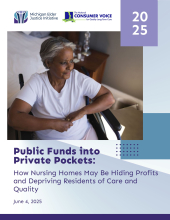
Recently Published Report & Resources
Report: “Public Funds into Private Pockets: How Nursing Homes May Be Hiding Profits and Depriving Residents of Care and Quality”
Click here for additional resources! (video clips from the report launch, nursing home residents’ quotes, etc.)
Many Michigan nursing homes struggle to provide adequate staffing and meet residents’ basic needs. While the nursing homes blame insufficient funding, there has been significant national attention to the lack of transparency and accountability in how nursing home corporations use billions of dollars of taxpayer funds. Researchers and regulators are particularly concerned about “related party transactions” in which nursing home corporations hide profits by making inflated payments for goods and services to other companies the nursing home corporation owns or controls. When these public funds are diverted to profits instead of necessary staffing and care, residents suffer.
The Michigan Nursing Home Transparency and Accountability Project, working in collaboration with national experts and the National Consumer Voice for Quality Long Term Care, seeks to examine how Michigan nursing homes allocate billions of dollars of public funds and whether those taxpayer dollars are used appropriately to meet residents’ critical needs. This novel project is Michigan Elder Justice Initiative’s newest endeavor in its long-standing efforts to improve nursing home residents’ quality of care and quality of life.
The issue of lack of transparency and accountability in nursing homes’ finances is gaining increasing attention at both the national and state level. For example:
- On June 30, 2025, United States Attorney Jerome F. Gorgon, Jr. announced a settlement with two Villa LLCs and six Villa nursing homes in southeast Michigan to resolve a lawsuit alleging that Villa violated the False Claims Act by systemically failing to provide services to nursing home residents and/or providing materially and grossly substandard services to nursing home residents as well as inadequate staffing and care. Under the terms of the settlement for the fraud case, the Villa defendants agreed to pay $4,500,000 to the United States and the State of Michigan. In addition, the defendants will enter into a five year Corporate Integrity Agreement (CIA) with the U.S. Department of Health and Human Services Office of Inspector General. Check out our response to federal charges against Villa Healthcare.
- On June 4, 2025, The Michigan Elder Justice Initiative (MEJI) in collaboration with The National Consumer Voice For Quality Long-Term Care released a report, Public Funds into Private Pockets: How Nursing Homes May Be Hiding Profits and Depriving Residents of Care and Quality, which examines financial practices of some low-performing Michigan nursing home chains. The report reveals how substantial public funding intended for resident care may be siphoned off as hidden profits, leaving many facilities with chronic understaffing, inadequate care, and diminished quality of life. Focusing on four nursing home chains with documented histories of poor performance, the report highlights the consequences of weak financial oversight and the urgent need for reform. It proposes common sense solutions that are being considered or have already been implemented in other states.
- An April, 2024 working paper by researchers from UCLA and Lehigh University concluded that in 2019, 63% of nursing home profits were hidden by nursing homes that made inflated payments for goods and services to companies with common ownership.
- In November, 2023, the federal Centers for Medicare and Medicaid issued a final rule that required nursing homes enrolled in Medicare or Medicaid — the majority of this country’s nursing homes — to disclose additional information regarding their owners, operators, and management. Nursing homes will also be required to document any entities that exercise financial control over the facility.
- The federal Department of Health and Human Services Office of Inspector General is examining how nursing homes spend taxpayer funds including analyzing how nursing homes may use “related party transactions” to divert profits to businesses they own or are connected to. According to a September 1, 2023 White House Fact Sheet, “These “related-party transactions,” have not only obscured how taxpayer funds are being used by nursing homes, but also obscure whether profits and payouts to shareholders are prioritized above investments in resident safety and fair wages for workers.”
- A March, 2023 report by the National Consumer Voice for Quality Long Term Care, Where Do the Billions of Dollars Go?: A Look at Nursing Home Related Party Transactions concluded that nursing homes funnel billions of dollars through related party transactions with little scrutiny from the federal government.
- In April, 2022, the National Academies of Sciences, Engineering and Medicine (NASEM) issued The National Imperative to Improve Nursing Home Quality: Honoring Our Commitment to Residents, Families and Staff. It concluded that facilities use “related-party transactions or unrelated business entities to hide profits.”
Although residents may be endangered if nursing home corporations divert public funds to profits instead of care, Michigan law is inadequate to ensure nursing homes’ use of billions of dollars of taxpayer funds is transparent and appropriate. MEJI is delighted to have been chosen as one of two state advocacy organizations to address nursing home transparency and accountability in a two-year project with the National Consumer Voice for Quality Long Term Care. Currently, we are in the second year of the project and are now focusing on advocacy and legislative and policy changes in Michigan. MEJI is grateful to the Metro Health Foundation, Service Employees International Union, and the CARE (Care for All with Respect and Equity) Fund for their enduring support of this important work.
To sign up to receive updates about this project, please click here.